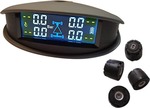10% OFF - TYRE PRESSURE MONITORING SYSTEM - GREAT SAFETY DEVICE
Maintaining correct tyre pressure ensures fuel efficiency, reduces tyre wear, the risk of aquaplaning and lack of traction. Generally all the necessary check-ups cost time and money that can be saved with this tyre pressure monitor system.
Handy Benefits of the Tyre Pressure Monitor System :
- Under-Inflated tyre pressure will cause excessive wear and tear not to mention unsafe driving conditions.
- Fuel Efficiency: The system instant monitoring device can save you additional fuel costs with the correct tyre pressure.
- Extends the life of your tyres saving you unnecessary tyre changes before they are required.
This tyre pressure monitor system comes complete with a User-Friendly Graphic Interface that enables the driver to easily check and maintain the vehicle and tyres are in safe condition.


that's nice but no price listed in post?